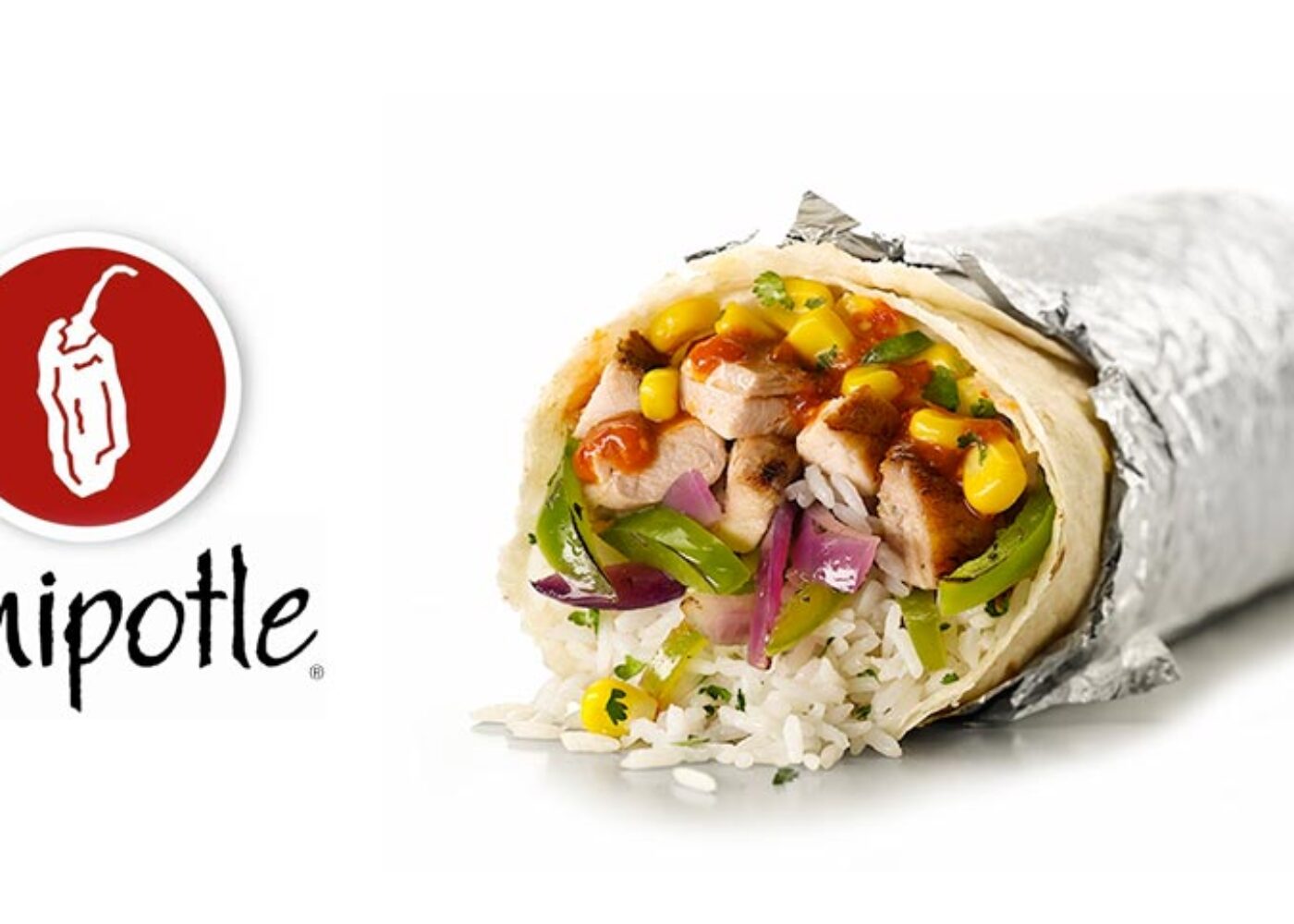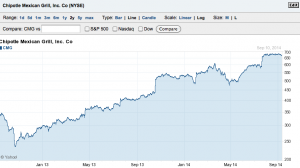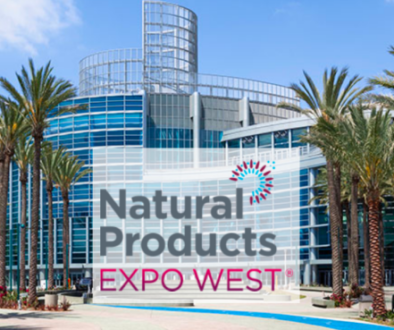Wall Street’s Leading Indicator: The Chipotle Non-GMO Burrito

 Wall Street sent Chipotle’s stock soaring when they announced that they were dumping genetically engineered ingredients from their food in 2014. The stock was up almost 72% year to date on the announcement in October, and the following Friday, the stock soared 15% to an all time high.
Wall Street sent Chipotle’s stock soaring when they announced that they were dumping genetically engineered ingredients from their food in 2014. The stock was up almost 72% year to date on the announcement in October, and the following Friday, the stock soared 15% to an all time high.
It’s not the first time this has happened. Wall Street fell in love with Annie’s IPO last year over a bowl of mac and cheese that wasn’t loaded with junk.
Contrast that with junk food companies that were just sued by a state attorney general for an attempt to keep consumers in the dark over how these same ingredients are quietly being inserted into food.
Food companies are now faced with an interesting choice: invest in a food supply free from genetically engineered ingredients or pour money into efforts in an attempt to keep consumers from knowing about them.
Chipotle announced in October that their revenue for the quarter was $827 million — up 18% the same quarter last year, beating analysts’ estimates of $820 million.
Comps (an industry term learned and tracked by analysts that measures same store comparable sales year over year, month over month, etc.) increased 6.2%. Compare that to other restaurants in the industry: Qdoba’s 0.5% and Taco Bell’s 2%, and you get a feel for the growing strength of Chipotle’s hold on consumers’ hearts, minds and stomachs.
So what is Chipotle doing right?
Rather than try to tell the consumer what to think or to keep them in the dark, they are listening.
And rather than stifle the growing desire of the American public to know more about the food that we are eating, Chipotle decided to meet us where we are and tell us.
And both customers and investors celebrated. Sales are up, with no price increase, and the stock soared 15% on Friday.
Is it a fluke? Not likely.
The first signs of Wall Street’s love of clean food came last year when Annie’s, the company that makes cleaner versions of mac and cheese and cheddar bunny snacks, went public. In response to that IPO, Annie’s had the biggest opening day gain in almost a year in March of 2012.
Of all the technologies that Wall Street saw in almost a year, investors got the most excited about a bowl of mac and cheese that didn’t contain the junk.
It wasn’t always this way. Back in the late 1990s, when I worked as an equity analyst, we celebrated how artificial ingredients drove down the cost of production and drove up profitability. Companies were quick to swap out the real stuff with these new ingredients that had been created in labs, and investors celebrated the change.
Until a growing body of scientific evidence started to highlight something else: that maybe we do not know what the long term effects of all of these things in combination might be.
Reports from the President’s Cancer Panel now tell us to start eating cleaner, since 41% of us were now expected to get cancer in our lifetime, and we know this data to be true because we see it happening in the lives of our friends, our families and our loved ones.
A food awakening has begun, or maybe it was forced upon us, as our kids get diagnosed with conditions that were barely heard of when we were kids, and we find ourselves suddenly trying to read labels. Ingredients we’ve never heard of and can’t pronounce or recognize.
Wall Street sees this, too. Disease doesn’t care where you work, you could be a teacher or an analyst.
Chipotle made a bet, to meet consumers where they are, and decided to dump meat loaded with antibiotics and growth hormones and genetically engineered ingredients hardwired for chemicals. Why dump what the industry has labeled “GMOs”? Because a growing number of consumers, legislators and food companies are opting out. Target and Safeway are rolling out new product lines, legislation is being introduced around the country, and people are waking up to the fact that these ingredients are so new that they are now patented by the U.S. Patent and Trademark Office and in some cases regulated by the EPA as a pesticide.
With their announcement to remove these new genetically engineered ingredients from their food, Chipotle’s stock hit a high and soared 15%.
They’ve got their finger on the pulse beating around the country, in Americans and especially in our kids who are the first generation expected to have a shorter lifespan than their parents.
And the market didn’t hammer them over a fear of supply chain issues or a bottleneck, investors simply gave them a thumbs up for the decision.
So what will happen to them next quarter? Next year? Will this ingredient swap drive up the cost of production?
Farmers, like consumers, are opting out of genetically engineered ingredients, too. A recent earnings report showed a 38% decline in the sale of genetically modified soybeans. Why? That method, genetically engineering a soybean to withstand increasing doses of weed killer, has been a fifteen year experiment on farms that is resulting in record uses of chemical applications. Perhaps farmers aren’t willing to go into any more debt to purchase yet more chemicals, or perhaps they are concerned over their legacy, farms that in many cases have been running for four and five generations, and what these chemicals are doing to the health of their soil. Whatever the reason, they are beginning to opt out, too.
As supply adjusts to meet demand, a new equilibrium will be set and a new price point. As more companies like Chipotle look to non genetically engineered ingredients, supply will increase to meet this growing demand and drive down costs making these products and others not loaded with artificial growth hormones, antibiotics and genetically engineered ingredients more affordable to all Americans.
It has to start somewhere. And it can’t happen fast enough.
Right now the food system that we have uses our national resources, what we contribute as taxpayers, to support genetically engineered ingredients and all of the chemicals required to grow them. While on the other hand, the farmers that opt out of this chemically intensive system and grow crops without the use of these genetically engineered ingredients (and chemicals required for them) are charged fees to prove that their crops are safe and then charged fees to label them. That’s like giving the guy who doesn’t wear a seatbelt a hall pass while fining the guy that does.
On top of that, the farmers that opt out of this genetically engineered system don’t get the same marketing support and crop insurance programs. In other words, their entire cost of production is higher, from marketing to insurance, for the farmers currently employing what we now call “organic” methods on their farms. It used to be the only way to farm.
But as a growing number of consumers and companies like Chipotle continue to make the switch, supply and demand for non genetically engineered ingredients grows, and so will demand for a policy change, so that these ingredients can be more affordable for all Americans.
The market opportunity in front of the food industry is enormous: farmers are opting out, and consumers are, too. The market sees it as evidenced by investors responses to companies like Annie’s and Chipotle.
So while the chemical and processed food industries continue to pour millions of dollars into efforts to keep consumers in the dark about the genetically engineered ingredients in our foods, their shareholders might want to pay attention as Wall Street pours millions into companies who are opting out of them. Chipotle’s stock is up almost 72% this year.
Just food for thought.





